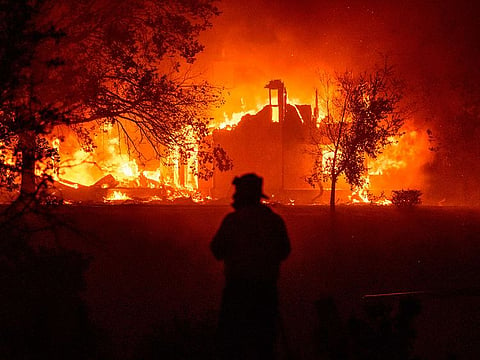How far-right narratives fan the flames of division
As LA burns, far-right exploits tragedy, blaming diversity and spreading disinformation

As firefighters fight tirelessly against the most devastating wildfires in California’s history, another firestorm erupts online.
Far-right influencers, media figures, and politicians seize the tragedy as an opportunity to spread divisive disinformation campaigns, blaming diversity initiatives and liberal policies for the destruction.
This exploitation of natural disasters to promote partisan agendas undermines essential climate action, disrupts emergency responses, and exacerbates societal divisions.
Disinformation campaigns have become a predictable feature of disasters in the United States. From hurricanes to wildfires, far right forces routinely exploit tragedies to spread false narratives.
These narratives — ranging from claims of federal disaster funds being redirected to migrants to conspiracy theories about controlled burns and water mismanagement — aim to sow mistrust in public institutions and shift blame away from the undeniable realities of climate change and systemic infrastructure challenges.
Fake social media campaigns
A recurring target of these disinformation campaigns is diversity, equity, and inclusion (DEI) initiatives. Leadership within California fire departments has faced baseless accusations of prioritising diversity over operational effectiveness.
Social media posts have falsely suggested that leadership’s emphasis on inclusion and equity compromises safety. Such rhetoric not only perpetuates harmful stereotypes but also distracts from the systemic factors exacerbating wildfires, such as climate change, urban sprawl, and ageing infrastructure.
By focusing on diversity as a scapegoat, disinformation campaigns obscure the urgent need for comprehensive solutions to mitigate the impacts of climate crises.
Scientific evidence leaves no doubt that climate change is a major driver of the increasingly severe and frequent wildfires. Decades of drought, followed by exceptionally wet years that fuelled vegetation growth in California, have created a tinderbox primed to ignite.
High winds have further accelerated the spread of the fires, leaving firefighters with limited options beyond evacuation and containment.
Despite this, prominent political figures and influencers have downplayed or outright denied the role of climate change. Instead, they have revived debunked claims about mismanagement by state officials and unsubstantiated allegations about water policies prioritising environmental conservation over human safety.
These narratives divert attention from the critical work needed to adapt to climate realities. Investments in fire-resistant infrastructure, improved water storage, and enhanced firefighting capacity are essential to safeguarding communities.
Yet, disinformation campaigns impede progress by fostering division and eroding public trust in science and government institutions.
Misinformation during disasters is not merely an annoyance; it has real-world consequences. False claims about budget cuts, diverted resources, and compromised firefighting efforts hinder the ability of emergency responders to coordinate and inform the public.
Viral posts alleging that federal disaster funds were redirected to migrants — a claim repeatedly debunked — have fuelled resentment and confusion among evacuees seeking assistance.
Additionally, conspiracies about looting and arson, often racially charged, exacerbate tensions and divert law enforcement resources away from critical rescue operations.
Far-right groups are increasingly exploiting natural disasters to discredit political elites and governing institutions while bolstering their own popularity.
By undermining trust in institutions and shifting the blame onto political elites, the far-right positions itself as a viable alternative, capitalising on the fear and uncertainty that disasters create.
This approach not only deepens political polarisation but also diverts attention from necessary systemic reforms, hindering meaningful progress in addressing the root causes of such crises.
The exploitation of natural disasters for political gain reflects a broader trend of using crises to advance partisan agendas. From hurricanes to wildfires, far right commentators have consistently targeted diversity policies, environmental regulations, and governance as scapegoats for complex problems.
These narratives tap into latent resentments against marginalised groups, framing them as threats to traditional values and societal stability. This approach deepens existing divisions and undermines the pursuit of equitable and effective solutions to shared challenges.
Social media platforms need to take greater responsibility for curbing the dissemination of false and harmful content. Recent decisions by mega social media platforms to reduce partnerships with fact-checkers and amplify sensationalist posts underscore the urgent need for stronger regulatory oversight and platform accountability.
Proactive efforts to dispel falsehoods and provide accurate information must be scaled up to match the speed and volume of disinformation.
Building resilience
As digital platforms become the primary source of information for many, teaching individuals to critically evaluate sources, verify facts, and recognise manipulation is essential to building resilience against disinformation.
To move forward, the narrative must shift from blame to solutions. The California wildfires highlight the urgent need for systemic action to address the root causes of natural disasters.
Climate change mitigation, sustainable urban planning, and investments in disaster preparedness are critical to reducing the frequency and severity of such events.
Embracing diversity and inclusion should be seen as a strength rather than a liability. Research consistently shows that diverse teams are better equipped to tackle complex challenges and foster community trust.
Efforts to create a workforce that reflects and serves the population enhance the ability to respond effectively to crises. The California wildfires are a stark reminder of the devastating impacts of climate change and the dangers of disinformation.
As firefighters risk their lives to protect communities, the spread of false narratives undermines their efforts and deepens societal divides. To combat this, truth, unity, and action must be prioritised over fear, division, and blame.
In the face of unprecedented challenges, it is a collective responsibility to rise above disinformation and work together to protect the shared future.
Sign up for the Daily Briefing
Get the latest news and updates straight to your inbox




